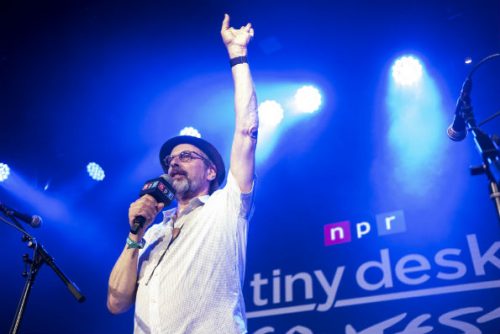
You created NPR’s all songs considered some 20 years ago. What keeps you engaged and excited about your work? I’m quite fortunate; new music comes my way every single day. I get to hear music by young musicians just getting started as well as hearing old favorites develop and change. I never get bored by that. I also have the opportunity to make a difference in the lives of creative people.
You have said before that you feel like intimacy is missing from music. Did you create tiny desk concerts to fill that void? I truly didn’t know what would happen when we started the Tiny Desk Concert series. After we posted the very first Tiny Desk Concert by Laura Gibson in April 2008, the incoming comments from listeners helped me realize that the stripped-down, unpolished performance in a slightly awkward setting created a sincere unfiltered connection between the musician and listener.
For tiny desk concert series virgins, which few shows would you recommend they check out to start?
My first suggestion is to be random, just hit play, and discover something you would never think to listen to. If you don’t like it, skip to the next one.
But a few favorites of mine are the group Moon Hooch, Superorganism, Moses Sumney and DakhaBrakha.
You are a musician yourself. Can you talk about why you make music? When I was about eight years old, I wanted to play music.
I started taking guitar lessons, but the music teacher told my mom I had no musical ability.That was quite shattering. It wasn’t until my mid-20s that I decided to quit my job, buy a synthesizer (an ARP Odyssey) and start making music.Within weeks I met my musical partner Michael Barron, we formed a band Tiny Desk Unit in the summer of ’79 here in D.C.We were the first band to play the 9:30 Club.To this day, we still make music together in a group called Danger Painters. I love the creative part, starting from nothing and making something that brings me joy.
How many concerts do you attend a week?
I often see ten bands in a week. I’m writing this on a Saturday; I’ve seen eight groups since Sunday,including BigThief, Joan Shelley, Palehound and a bunch of others I’m sure few have yet heard of.
Cell phones at concerts. Thoughts? I love capturing memories. Looking back on photographs reminds me of things I’ve seen.
People should be able to take pictures at concerts, but I also think people need to be considerate of others. So, capture your moments, then put your phone in your pocket and continue to enjoy the show.The idea that if you’re taking pictures at a show, you’re not “present” at the show is just silly. I can listen and take a photo at the same time.
A few years ago you published a book “Your song changed my life” interviewing musicians about the tunes that helped dictate their careers. Why was that an important endeavor for you? I’ve interviewed so many musicians in my 30-plus years at NPR, and the one thing that struck me is how much musicians love to talk about the music that inspired them. I had never written a book, never thought of myself as a writer, and so it was a personal challenge to do something I’d never dreamed capable of.
What’s next? We’re thinking up new ideas around the Tiny Desk Concert series.We had a Tiny Desk Fest; a series of evening performances at NPR broadcasted live from my desk.
Last year in Austin, we did something called the Tiny Desk Family Hour, nine Tiny Desk alum, playing 15-minute sets at a church in Austin during SXSW. The show “All Songs Considered” I created is about to turn 20 years old, and along with Robin Hilton, we continue to grow that podcast. Last month we produced 17 podcasts all centered around creative musicians with the hopes of inspiring listeners.
MY TOP SPOTS
Favorite Local Bands? The Messthetics, Marian McLaughlin, Cigarette, Flasher and Priests are a few that immediately come to mind.
My history with the 9:30 club is deep. The basement was my band’s rehearsal space back when it was at 930 F Street. We played there a lot…as the first and last band to play that location. I’ve seen so many stellar shows there.
The people there care about the music and the musicians, and it’s pretty much guaranteed you’ll be treated to a great sounding show.
Glenstone in Potomac, Md. is a remarkable space filled with unusual art and architecture. It’s an escape from the city in an inspiring setting.
I’ve been enjoying the Pie shop. It’s a place created by a musician and features impressive sweet and savory pies downstairs and a small music venue and bar upstairs—kind of a perfect combo.
This article appeared in the February 2020 issue of Washington Life magazine.
